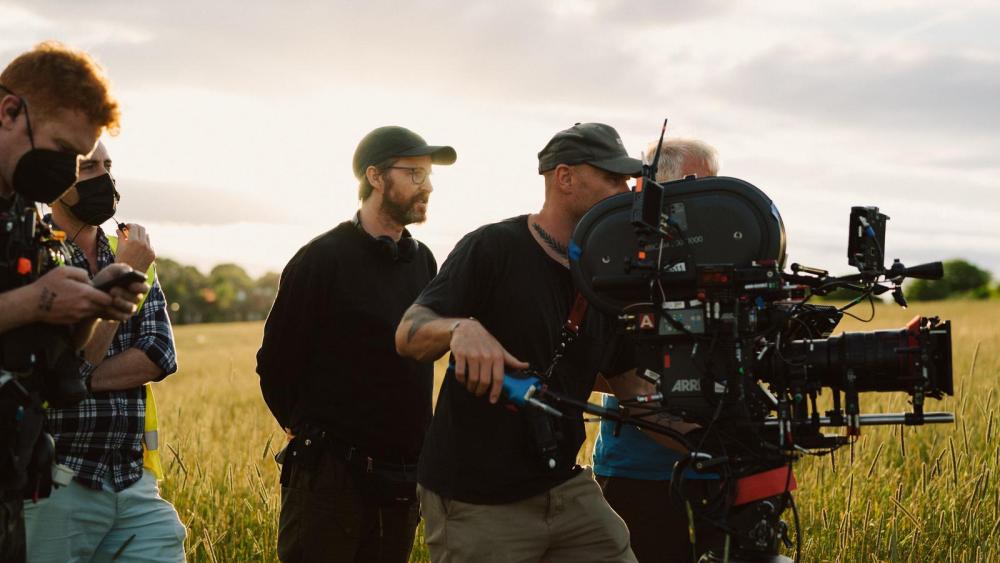Andrew Haigh has described “All of Us Strangers,” a spectral meditation on love and loneliness, as a deeply personal film, one infused with his own feelings about parents and relationships. That’s not unique — write what you know is an adage for a reason. But “All of Us Strangers” may be one of the only major movies to have been shot in the childhood home of its creator. Shortly before production commenced, Haigh knocked on the door of the house he lived in until he was 7 or 8 years old and discovered that little had changed in the ensuing decades.
“The owner agreed to let us film there,” Haigh says. “He hadn’t really decorated it in 30 years, so all these memories came flooding back. And then we used my old photos to make it look almost exactly as it had. It was so emotional for me, but it was also cathartic. It was a chance to re-approach my past.”
That’s exactly what Adam (Andrew Scott), a gay man in his 40s living a life of quiet desperation in a starkly modern London apartment building, undergoes in “All of Us Strangers.” Although his catharsis has a supernatural element. One night, he returns to his old neighborhood to find his parents (Claire Foy and Jamie Bell) alive and well — even though they died in their 30s when Adam was a child. He keeps coming back, hoping to better understand how their loss shaped the person he became.
“I can relate to what he’s feeling,” Haigh says. “The child in us is essentially always there and stuff that you carry around as a kid. You think you’ve grown out of it, but it can bubble over, affecting how we live.”
There were important differences in Haigh’s story and that of his protagonist. Most notably, the writer and director’s father and mother are still alive. But even if he didn’t experience the same type of tragedy as Adam, his parents’ divorce when he was a preteen rattled his sense of security.
“When my family broke down it created this loss at the center of things that was difficult to cope with, so in some strange sense I experienced a grieving process,” he says.
At the same time Adam finds himself drawn back into his past, a chance encounter with a 20-something neighbor (Paul Mescal) presents the prospect of a romantic future. And one of the things that makes “All of Us Strangers” so compelling is that its four leads are from three distinct generations. That’s shaped the way they see their world, and it enabled Haigh to reflect on his experiences growing up queer in the 1980s and ’90s. AIDS cast a mushroom cloud-like pall over everything, and homophobia was rampant. There’s a moment in “All of Us Strangers” where Adam comes out to his mother, and her reaction is not one of disgust or unyielding support, but deep concern.
Love Film & TV?
Get your daily dose of everything happening in music, film and TV in Australia and abroad.
“I wanted to remind myself and people who are watching what it was like back in that time,” Haigh says. “It was a very different experience to come out, so how the mother reacts in the film is exactly what everybody was thinking at that time. It was how we thought about ourselves. We worried we’d be lonely, and we wouldn’t find love.”
Haigh feared that a younger generation of queer viewers, raised during an era of wider cultural and political acceptance, wouldn’t be able to relate. “All of Us Strangers” won’t hit theaters until Dec. 22, but the reaction among audiences at Telluride and the New York Film Festival, has reassured him that the film’s themes of buried pain and isolation resonate.
“It’s interesting talking to younger gay people because we’re always told that everything is better now, but that doesn’t mean that they aren’t still struggling and they don’t feel separated from their family,” Haigh says. “And lots of people who aren’t queer take something from it. It hits people in different ways, but I think everyone feels alone some time.”
Critics have embraced “All of Us Strangers,” just as they have endorsed Haigh’s previous works such as “Weekend,” “45 Years” and “Lean on Pete.” But the filmmaker, who has built up a sturdy base of fans, admits that he’s terrified each time he embarks on a new project. Yet he’s learned to embrace the feeling of anxiety that grips him.
“What you soon realize is everyone is terrified,” Haigh says. “Actors are just as nervous as directors. That was a comforting realization. I remember talking to Tom Courtenay on the first day shooting ‘45 Years,’ and he was petrified. This is a legend and he’s still scared. As a director, you just want to create a space where people can use that vulnerability to do work that they feel good about.”
From Variety US































